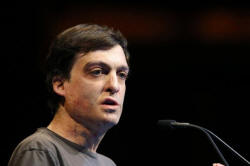Economist Dan Ariely has a fix for our financial foibles
 Send a link to a friend
Send a link to a friend
 [November 21, 2017]
By Chris Taylor [November 21, 2017]
By Chris Taylor
NEW YORK(Reuters) - No offense, but you are
probably dumb with money.
You are human, and we are simply wired to make dumb financial decisions,
like spending too much or saving too little.
Famed behavioral economist Dan Ariely set out to discover where we go
wrong in his new book, "Dollars and Sense: How We Misthink Money, and
How to Spend Smarter." Reuters spoke with the Duke University professor
to talk about our financial foibles, and how to fix them.
Q: You start the book by saying we do not really understand money at
all. Why is that?
A: Money is all about opportunity cost. Every time you buy a $4 cup of
coffee, you are giving up $4 that could be going to something else. What
we should be asking ourselves all the time is, 'Is this the best
possible way to spend $4?' But it is hard to think about life this way,
especially if you have payments that aren't made immediately, like
credit cards or mortgages or car loans or taxes.

Q: You also say that we often value things incorrectly. How so?
A: We evaluate things not based on the product itself, but on a whole
range of other attributes, like the effort that has gone into it, or the
language used to describe it. Companies like Apple are very good at
this: They go on stage and tell us about little things like the type of
metal they use for laptop hinges. Then we say, 'Look at this amazing
design, and how much effort they put into this!' And we pay all this
money.
Q: You likened our financial decision-making to Enron. Are we really
that bad?
A: We use funny mental accounting all the time, to trick ourselves into
spending more. Companies like Enron had shady accounting practices,
shifting money around between different departments, and we do the same
thing. For instance if we decide something comes from our 'entertainment
fund,' then we are usually OK with spending it.
Q: Even when we know the right financial thing to do, we often still
don't do it. Why is that?
[to top of second column] |

Dan Ariely, professor of psychology and behavioral economics, speaks
at the Sohn Investment Conference in New York, May 5, 2014.
REUTERS/Eduardo Munoz

A: It's about short-term versus long-term, and humans are just not good at
thinking long-term. It is also about abstract versus concrete: Give up something
concrete now, for something abstract later.
It is also because digital money has changed the act of saving. A thousand years
ago, you used to look in your yard and see how many goats you had, and compete
with your neighbors. Now your saving is invisible, and that is a terrible thing.
No wonder we give it less attention.
Q: How do we overcome all these failings, and save more for the future?
A: Envisioning yourself as an older person really helps, because it makes the
prospect seem more real. Another trick is to discuss your 401(k) savings with
your significant other or your family. That way the act of saving will be
appreciated, and it goes from being invisible to being visible. You should also
set up barriers to temptation, like automatic deductions, which can help us stay
closer to where we want to be.
In terms of valuing things correctly, try to ignore sales and discounts, which
basically mean nothing. If a $200 shirt is marked down to $100, don't think
about it being 50 percent off; think about whether or not you want to pay $100
for a shirt.
Another tool for thinking about value is having a yardstick. For instance, if
you're buying a new bicycle - is that bicycle worth 20 hours of your labor? Or
if you are having a nice dinner, is that dinner worth three hours of work? That
way you can compare it to other things you love. That is opportunity cost - and
that is the essence of money.

(Editing by Beth PinskerEditing by Jonathan Oatis)
[© 2017 Thomson Reuters. All rights
reserved.] Copyright 2017 Reuters. All rights reserved. This material may not be published,
broadcast, rewritten or redistributed. |